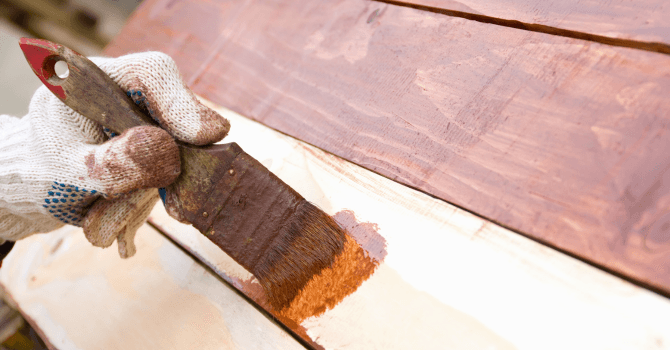
Let’s be real, wood isn’t easily replaceable. We can all agree that wood’s warmth and versatility are especially valued. We like that it’s easily worked and offered in a variety of essences to suit all preferences. Both authentic and malleable, wood works wonders no matter what.
However, a well-known fact about wood is that it requires maintenance when used outdoors. Painting wood revamps it so that you can enjoy it for many years to come rather than replace it.
Paint and Stain on Treated Wood: Our Top Tips
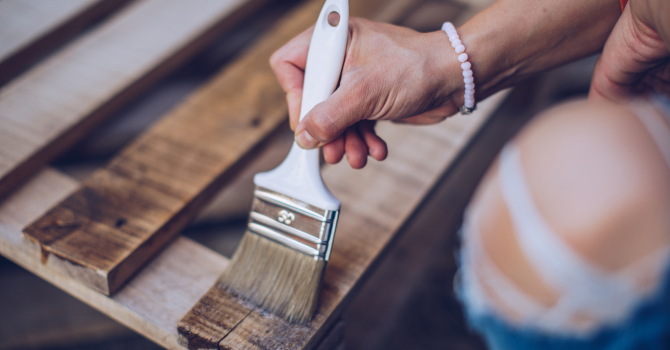
Source: Canva
Ideally used to build decks and porches, or as exterior cladding, pressure-treated wood is both eco-friendly and mould- and insect-resistant.
Unlike creosote wood, treated wood can be coated with all types of exterior paint finishes. Ideally suited for durable construction, wood is protected by preservatives. Such products are available in a variety of colours, especially in the semi-transparent stain category.
Fall is a prime time for exterior painting projects, especially when it comes to repainting the siding on your home. Summer is also a good time to paint because the sun helps the wood dry quickly. Regardless of when you choose to apply paint, steer clear of very humid days. Moisture, the main cause of blistering and peeling, can quickly wreak havoc on your project.
Pro tip: Beware of morning dew. Wait until the dew has cleared and the air has warmed before you start painting in the morning. In the afternoon, put your brushes away early enough to give the paint time to dry before nightfall. Paint also dries somewhat more slowly as the temperature drops. If the overnight temperatures are cool, the paint may still be sticky by morning.
Getting paint to stick to wood: A flawless finish in 3 steps
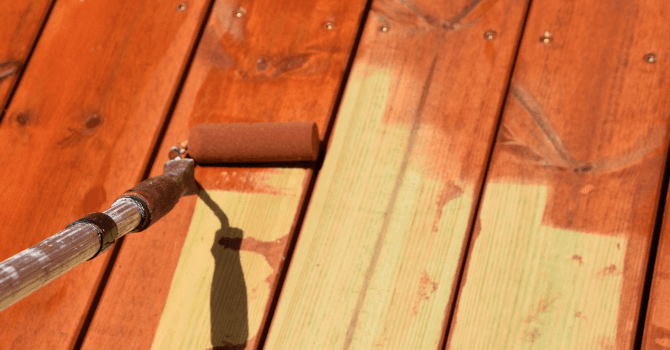
Source: Canva
Anyone can paint wood. However, whether it's a door, deck, fence, or furniture, to get a professional-looking result, you'll need the right tools, the right products, and the right technique. With every step of the process, everything must be done properly. Here's a list of tips to avoid making mistakes while painting.
Step 1: Prepare the surface
Albeit crucial for a decent finish, adequately preparing the surface is often an overlooked step when painting.
Clean the wood prior to painting it
Grease and dirt prevent paint from holding up, increase the drying time, and result in the paint's yellowing. Start by vacuuming or spot-dusting all surfaces. Then, use a degreaser (a trisodium phosphate solution or TSP) to eliminate grease stains, dirt, or any other contaminants.
Remove the current coat of paint
If there are paint remnants, remove the latter with a putty knife. Simply scrape the surface. Sanding will help remove all residual paint. If the paint isn’t easily removed, use a stripper.
Step 2: Sand the wood
Essentially, sanding down the wood will make the surface smooth and favourable to the new coat of paint’s adherence. The wood must be completely dry. On rougher surfaces, use coarse grit paper. On surfaces with fewer imperfections, medium-grit paper will get the job done. For a quality finish, close this step by sanding the entire surface with fine-grit paper.
Tips: Always sand with the grain, not against it. Never use a metal wire brush or stainless steel on wood as it’ll damage the fibres. Don’t push down on the sander to avoid digging into the wood.
Trick: To easily remove dust, use a vacuum and then wipe down the surface with a damp rag.
Step 3: Apply the paint
The paint is applied according to a few steps.
Apply a coat of primer
Since wood is a porous material, it absorbs paint unevenly. By applying a primer, it allows for an even layer of paint. It can also help conceal any small flaws like stains that didn’t come out when you cleaned the surface.
The primer can be applied with a paintbrush or a roller. Depending on the surface and product you’re using, you may need one or more coats of primer.
Tip: On wood, using an oil-based primer is best since a latex one risks raising the wood grain. A grey primer is preferred beneath dark paint and a white or clear primer beneath a light shade.
Apply a finish coat with a paintbrush or roller
For vertical surfaces, it’s best to paint from top to bottom, and always with the grain, not against it. By painting in one go, you’re ensuring that there are no brush or roller strokes. Apply as many coats of paint as necessary to obtain the desired result.
Pro tip: Is your painting project spread out over several days? Instead of cleaning your paintbrushes and rollers every day, slip them into individual bags, seal them, and leave them in the refrigerator.
Apply a protective finish
Many types of paint are advertised as providing water or wear protection. However, it's best to apply a product specially designed to ensure the durability of the wood. The varnishes currently available on the market include a wide range of finishes that highlight the beauty of your project while also adequately protecting it. For an impeccable finish, lightly sand the surface between each coat of varnish.
Trick: Varnish is a little denser than paint. Apply thin coats of varnish to avoid bubbling, drippage, and streaks.
How to Paint or Stain Wood Patio Furniture
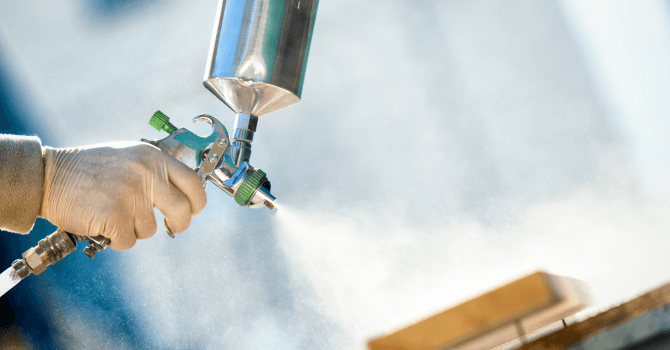
Source: Canva
Talk about the perfect weekend project! By following along with the steps detailed below, you’ll be able to benefit from your garden furniture for many years to come. Here’s how to go about it.
Step 1: Prepare the surface
Start by looking over all the surfaces. If there’s mould, clean it off with a part of bleach and a three-part water solution. Rinse and allow to dry.
On a cold day, move the furniture inside the house so that it dries faster. When the weather is nice, just ensure it's sheltered from the rain. Don't cover the furniture with a tarp or plastic sheet since adequate air circulation allows it to dry completely.
Step 2: Sand and strip the surface
Sand the wood with the grain, first with coarse-grit paper, then with finer paper until the surface finish is nice and smooth. If necessary, use a stripper to remove the current layer of paint.
Step 3: Apply and treat wood paint
The old layer of paint or stain can sometimes serve as a primer. Otherwise, ask a capable sales representative for help in choosing the right primer for the job at hand.
To paint wood garden furniture, you have to choose quality products that won’t alter when exposed to the sun, will resist adverse weather conditions, and will also protect the wood. Keep in mind that exterior wood paint needs to be more efficient than interior wood paint.
Once painted, leave your furniture to dry in a clean, well-ventilated area. Don't leave the furniture outside because the wind carries dust and particles that can stick to the still-wet surfaces.
What type of paint should be used on wood?
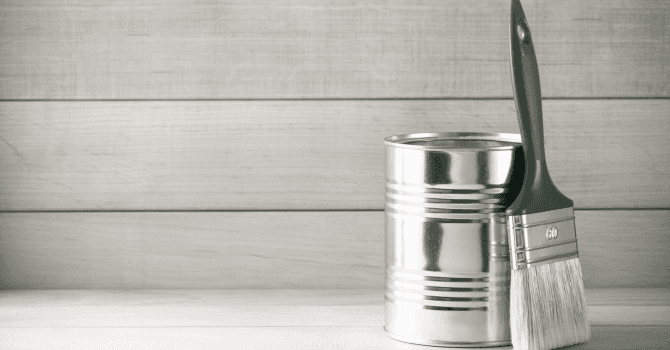
Source: Canva
To paint wood, you have to choose the right type of paint. Depending on the surface and the intended use, you can choose between acrylic paint, solvent-based paint, oil-based paint, or spray paint. Every type of paint has its respective advantages and disadvantages, and for that matter, you’ll have to choose according to your specific needs.
Here are a few Canadian wood paint brands that’ll improve your décor. This type of paint is normally available in several colours and can also be used on flooring.
INSL-X Prime Lock Plus – $49.99
Prime Lock Plus is an all-purpose, high-coverage primer that gives the finishing coat a gloss and even appearance. It can be coated with a layer of alkyd or latex finish. It can also be used as a touch-up primer for outdoor surfaces.
SICO Exterior Wood Paint and Primer – $79.99
This 100% acrylic latex paint has the distinct benefit of working at temperatures ranging from 1°C to 32°C. It doesn’t require a primer, is resistant to mould, and has excellent UV ray resistance too.
Benjamin Moore’s AURA Exterior Paint – $39.99 to $109.99
AURA exterior paint allows you to carry out your projects in record time, while still using less paint. We appreciate the fact that it has superior coverage, excellent durability, and colour-fade resistance.
Get 3 renovation quotes for your wood painting project
RenoQuotes.com can help you get quotes for your painting project. By submitting your project, we’ll put you in contact with top-rated contractors. Fill in the form on the homepage (it only takes a few minutes), and you will get estimates from trusted professionals.
Dial 1-844 828-1588 to speak with one of our customer service representatives.
Looking for something else?
Related articles
The latest industry news, interviews, technologies, and resources.

Editorial Team
•08 Nov 2023
The idea of renovating your house can sometimes spring up at an unexpected moment. Next thing you know, you find yourself browsing the internet looking for inspiration on Pinterest. However, if you're renting your apartment, it could be difficult to start any renovation projects. The final decision will be up to your landlord if you need to make any major changes to your space.

Editorial Team
•28 Jan 2026
Back in 2023, Viva Magenta was elected the colour of the year by Pantone, and one by one, people fell in line with this trend. This year, it couldn’t be any more different. Trend forecasters, renowned designers, and the most well-known paint manufacturers failed to reach a consensus on a preferred colour.
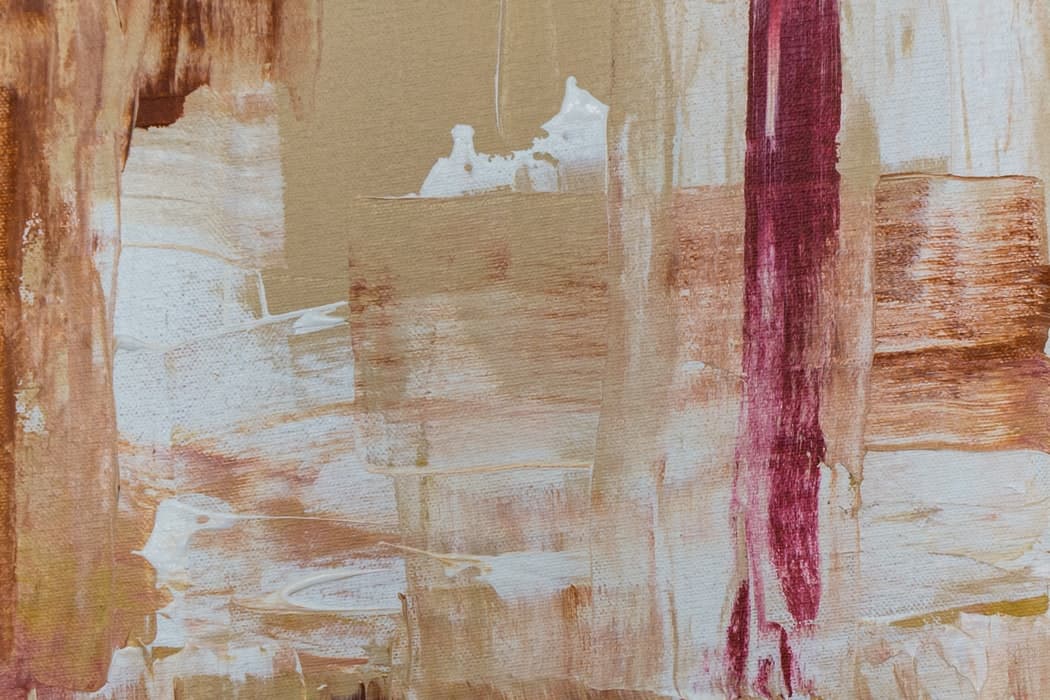
Léa Plourde-Archer
•08 Nov 2023
With the new year starting and the wind of renewal that is blowing in, paint companies are currently announcing their colour of the year. These companies are offering eclectic and creative palettes, which perfectly follow the trends of the coming year.

Editorial Team
•08 Nov 2023
Even though we may spend a lot of time indoors, we’re all looking for that connection to the exterior. Building a wood patio is an excellent way to spend some time outside, whether that means entertaining or spend quality time with friends and family. Not only is a wood patio a beautiful spot to enjoy the great outdoors, but it will increase the value of your home overall. If you’re looking to take on this project, you might be wondering what models are available on the market as well as how much this is going to cost.

Editorial Team
•01 Dec 2025
Have you ever wondered how electric baseboard heaters work or why they remain so popular despite newer heating options? The term “electric baseboard heater” evokes the same comfort as an oversized sweater—warm, cozy, and a source of solace when winter arrives. While these heaters aren’t a new invention, they continue to be a go-to choice as soon as the cold front hits. Some people are startled by the initial sizzle when turning them on, while others find the familiar sound reassuring, signaling a cozy escape from the winter chill.